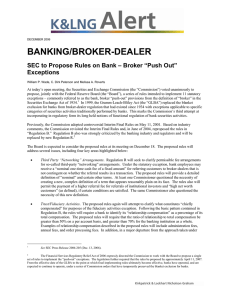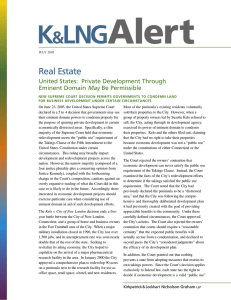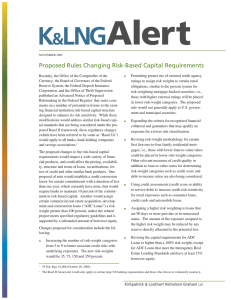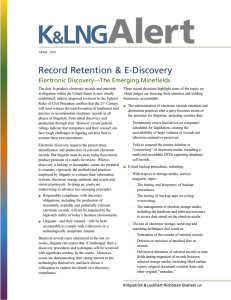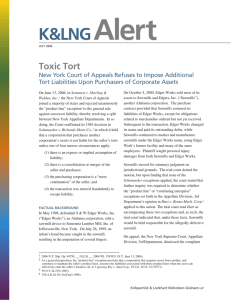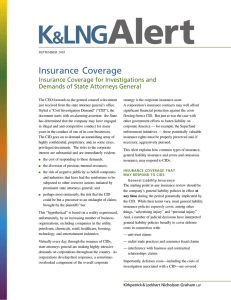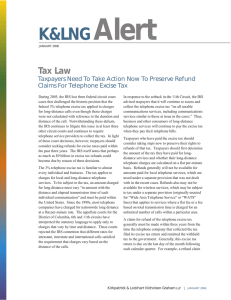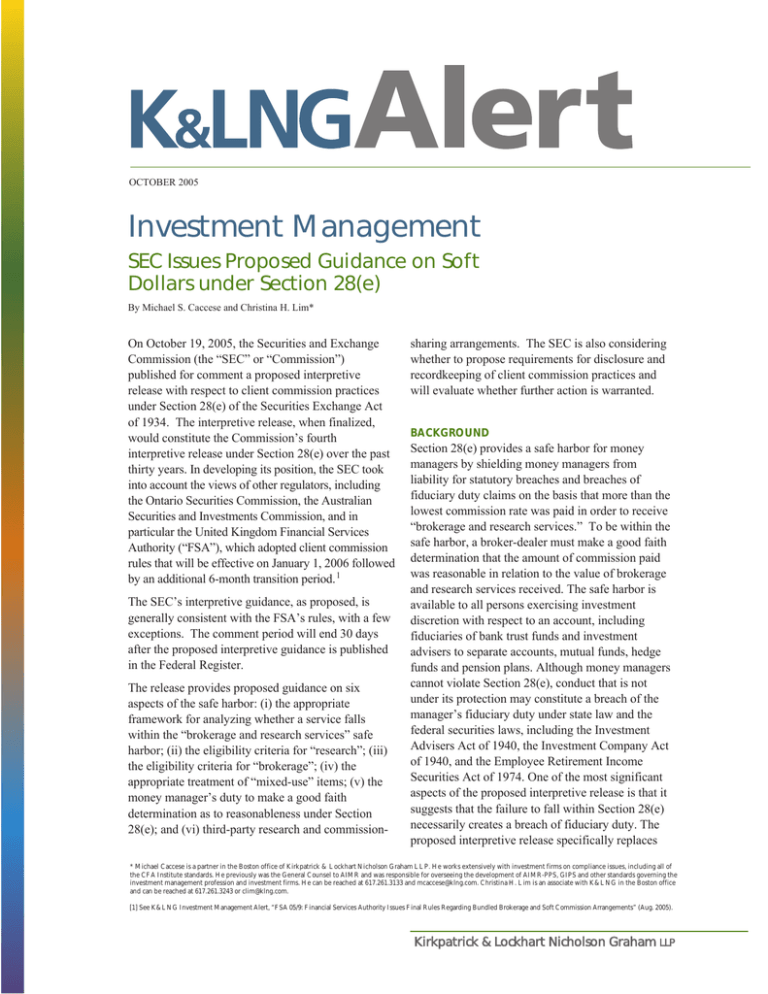
OCTOBER 2005
Investment Management
SEC Issues Proposed Guidance on Soft
Dollars under Section 28(e)
By Michael S. Caccese and Christina H. Lim*
On October 19, 2005, the Securities and Exchange
Commission (the “SEC” or “Commission”)
published for comment a proposed interpretive
release with respect to client commission practices
under Section 28(e) of the Securities Exchange Act
of 1934. The interpretive release, when finalized,
would constitute the Commission’s fourth
interpretive release under Section 28(e) over the past
thirty years. In developing its position, the SEC took
into account the views of other regulators, including
the Ontario Securities Commission, the Australian
Securities and Investments Commission, and in
particular the United Kingdom Financial Services
Authority (“FSA”), which adopted client commission
rules that will be effective on January 1, 2006 followed
by an additional 6-month transition period. 1
The SEC’s interpretive guidance, as proposed, is
generally consistent with the FSA’s rules, with a few
exceptions. The comment period will end 30 days
after the proposed interpretive guidance is published
in the Federal Register.
The release provides proposed guidance on six
aspects of the safe harbor: (i) the appropriate
framework for analyzing whether a service falls
within the “brokerage and research services” safe
harbor; (ii) the eligibility criteria for “research”; (iii)
the eligibility criteria for “brokerage”; (iv) the
appropriate treatment of “mixed-use” items; (v) the
money manager’s duty to make a good faith
determination as to reasonableness under Section
28(e); and (vi) third-party research and commission-
sharing arrangements. The SEC is also considering
whether to propose requirements for disclosure and
recordkeeping of client commission practices and
will evaluate whether further action is warranted.
BACKGROUND
Section 28(e) provides a safe harbor for money
managers by shielding money managers from
liability for statutory breaches and breaches of
fiduciary duty claims on the basis that more than the
lowest commission rate was paid in order to receive
“brokerage and research services.” To be within the
safe harbor, a broker-dealer must make a good faith
determination that the amount of commission paid
was reasonable in relation to the value of brokerage
and research services received. The safe harbor is
available to all persons exercising investment
discretion with respect to an account, including
fiduciaries of bank trust funds and investment
advisers to separate accounts, mutual funds, hedge
funds and pension plans. Although money managers
cannot violate Section 28(e), conduct that is not
under its protection may constitute a breach of the
manager’s fiduciary duty under state law and the
federal securities laws, including the Investment
Advisers Act of 1940, the Investment Company Act
of 1940, and the Employee Retirement Income
Securities Act of 1974. One of the most significant
aspects of the proposed interpretive release is that it
suggests that the failure to fall within Section 28(e)
necessarily creates a breach of fiduciary duty. The
proposed interpretive release specifically replaces
* Michael Caccese is a partner in the Boston office of Kirkpatrick & Lockhart Nicholson Graham LLP. He works extensively with investment firms on compliance issues, including all of
the CFA Institute standards. He previously was the General Counsel to AIMR and was responsible for overseeing the development of AIMR-PPS, GIPS and other standards governing the
investment management profession and investment firms. He can be reached at 617.261.3133 and mcaccese@klng.com. Christina H. Lim is an associate with K&LNG in the Boston office
and can be reached at 617.261.3243 or clim@klng.com.
[1] See K&LNG Investment Management Alert, “FSA 05/9: Financial Services Authority Issues Final Rules Regarding Bundled Brokerage and Soft Commission Arrangements” (Aug. 2005).
Kirkpatrick & Lockhart Nicholson Graham
LLP
Sections II and III of its 1986 Release with revised
interpretations, which give guidance as to third party
research and the meaning of the phrase “brokerage
and research services” in Section 28(e). These
revised interpretations specifically change the
definitions of "research" and "third-party research"
arrangements, and establish a temporal standard for
brokerage services.
FRAMEWORK FOR ANALYZING THE SCOPE OF
“BROKERAGE AND RESEARCH SERVICES”
A money manager may avail itself of the Section
28(e) safe harbor so long as the manager:
■
■
■
determines that the product or service is eligible
under the statute;
uses the item in performing its decision-making
responsibilities for accounts over which the
manager exercises investment discretion; and
makes a good faith determination that the
amount of commissions paid is reasonable in
relation to the value of research or brokerage
product or service received.
RESEARCH SERVICES
Eligibility: Expression of Reasoning or
Knowledge
In order for a product or service to constitute
“research services” under the safe harbor, the product
or service must constitute “advice,” “analyses” or
“reports” within the meaning of the statute. The
proposed interpretive release gives guidance that in
order to constitute “advice,” “analyses” or “reports,”
the money manager must make the determination that
the product or service reflects the “expression of
reasoning or knowledge.” Moreover, even if the
product constitutes “advice,” “analysis,” or a
“report,” the money manager must determine that the
subject matter of the product or service falls within
the categories specified in the statute. That is, advice
must relate to the “value of securities, the advisability
of investing in, purchasing, or selling securities, and
the availability of securities or purchasers or sellers
of securities” and “analyses and reports” must relate
to “issuers, industries, securities, economic factors
and trends, portfolio strategy, and the performance of
accounts.”
Examples of potentially permissible research services
described in the proposed interpretive release
2 OCTOBER 2005
include: traditional research reports, financial
newsletters and trade journals relating to the subject
matter specified in the statute; software that both
analyzes securities portfolios and reflects the
expression of reasoning or knowledge; seminars or
conferences on a subject matter specified in the
statute, and market or economic data. Services
deemed not to reflect the expression of reasoning and
knowledge include products with inherently tangible
or physical attributes, such as telephone lines, office
furniture, and operational overhead expenses.
Contrary to the 1986 Release, computer hardware
and computer accessories are not eligible for research
services since they are deemed not to reflect
substantive content related to investment decisionmaking by the manager.
Lawful and Appropriate Assistance
In addition to meeting the statutory criteria, a product
or service must also provide the money manager with
“lawful and appropriate assistance” in making
investment decisions. The proposed interpretive
release states that whether a product provides “lawful
and appropriate assistance” is determined largely on
how the eligible product or service is used by the
manager. For instance, account performance
analyses used for marketing purposes do not fall
within the safe harbor, but may fall within the safe
harbor when used for investment decision-making
purposes. Where eligible research is used for
purposes within and outside of Section 28(e), the
manager must treat the product or service as a mixeduse item and use client commissions to pay only the
allocable portion of the item attributable to use for
investment decision-making.
BROKERAGE SERVICES
Eligibility: Temporal Standard
Section 28(e) explicitly states that brokerage products
and services that are eligible under the safe harbor
include activities required to effect securities
transactions, functions incidental to securities
transactions (e.g., clearance, settlement and custody),
and services that are required by the SEC or SRO
rules. The proposed interpretive release proposes a
temporal standard for “brokerage services” under
Section 28(e) whereby eligible “brokerage services”
are those services provided between the time that an
order is transmitted to a broker-dealer and the time
that the transaction is cleared and settled (i.e., when
funds or securities are delivered or credited to the
advised account or the account holder’s agent).
KIRKPATRICK & LOCKHART NICHOLSON GRAHAM LLP
Services provided prior to an order transmission may
fall within the research portion of the safe harbor, but
are not eligible under the brokerage portion of the
safe harbor.
Under the proposed temporal standard,
communications services related to execution,
clearance and settlement and other incidental
functions are eligible brokerage services. Moreover,
algorithmic trading software and trading software
used to route orders to market centers constitute
“brokerage” under the safe harbor. Although
peripherals and delivery mechanisms associated with
computer hardware (e.g., telecommunications lines,
transatlantic cables, and computer cables) are deemed
to fall outside of the “research services” safe harbor,
they may be eligible under the “brokerage services”
safe harbor since the transmission of orders is
considered to be a “core part of the brokerage
service.” However, products and services that are not
integral to the execution of orders by broker-dealers
and fall outside of the temporal standard do not
qualify as “brokerage” in the safe harbor. Examples
of ineligible products or services under the proposed
temporal standard include: order management
systems used by managers to manage their orders
(whether developed in-house by the manager or by a
third-party) and hardware (e.g., telephones or
computer terminals); trade analytics, and surveillance
systems. The proposed interpretive guidance also
confirms that error correction trades or related
services in connection with errors made by money
managers are not eligible “brokerage services” under
the safe harbor since they do not benefit the advised
account and are separate transactions to correct the
manager’s error.
Lawful and Appropriate Assistance
As with research products and services, eligible
brokerage products and services must provide the
money manager with lawful and appropriate
assistance in carrying out its responsibilities and a
good faith determination must be made by the money
manager that the amount of commissions paid is
reasonable in relation to the value of the brokerage
product or service received.
MIXED-USE ITEMS
The proposed interpretive release reiterates the SEC’s
guidance in its 1986 Release regarding the mixed-use
standard: if a money manager uses a research product
or service for both research and non-research
functions, the money manager must make a
reasonable allocation of the cost of the product
3 OCTOBER 2005
according to its use (i.e., the percentage of the
product that provides assistance to the investment
decision-making process may be paid for with soft
dollars whereas the other non-research portion must
be paid for by the manager with hard dollars). The
manager must keep adequate records of these
allocations to make a good faith determination that
the amount paid for the mixed-use item in soft
dollars was reasonable in relation to the value of the
research product or service received.
GOOD-FAITH DETERMINATION AS TO
REASONABLENESS
Each money manager seeking to avail itself of the
safe harbor bears the burden of proof that it has made
a good faith determination that the commissions paid
are reasonable in relation to the value of brokerage
and research services received, whether in terms of a
particular transaction or the manager’s overall
responsibilities for its discretionary accounts. The
SEC also emphasized that managers must make a
good faith determination that any additional
commissions paid for “simply copied, repackaged, or
aggregated” products or services are reasonable.
THIRD-PARTY RESEARCH
In third-party research arrangements, money
managers may use client commissions to obtain
research produced by someone other than the
executing broker-dealer. The proposed interpretive
release clarifies that research provided under these
arrangements is eligible under Section 28(e) so long
as the broker-dealer effecting the trade (e.g.,
clearance and settlement) is legally obligated to pay
for any third party research provided to a money
manager.
COMMISSION-SHARING ARRANGEMENTS
Commission sharing arrangements may be used by
money managers as a means to acquire research via
commissions. The proposed interpretive release
addressed commission sharing arrangements. These
arrangements allow managers to execute trades with
one broker-dealer and obtain research or other
services from another broker-dealer. Under the
proposed interpretive release, the roles assumed by
each broker-dealer will determine whether a
commission-sharing arrangement is permissible
under Section 28(e). In order for a commissionsharing arrangement under which research and
brokerage services are provided to fall within the
safe harbor, the proposed interpretive release
KIRKPATRICK & LOCKHART NICHOLSON GRAHAM LLP
requires the following elements to be present:
■
The commission-sharing arrangement must be
part of a “normal and legitimate correspondent
relationship” whereby each broker-dealer’s
involvement is more significant than the mere
receipt of commissions paid for research
services provided to money managers. This
means that the introducing broker-dealer must:
be financially responsible to the clearing
broker-dealer for all customer trades until
the clearing broker-dealer receives payment
(or securities);
make and/or maintain records relating to its
customer trades required by SEC and SRO
rules (e.g., blotters and memoranda of
orders);
monitor and respond to customer comments
concerning the trading process; and
CONCLUSION
Comments on the proposed interpretive release must
be submitted to the SEC on or before the thirtieth
day after the release is published in the Federal
Register. Specifically, the SEC is seeking
comments on whether the proposed release is an
accurate reflection of industry practices, whether
there are any other significant issues under Section
28(e) that were not addressed, and whether the
interpretive guidance would affect the level and
distribution of costs and if so, whether these effects
would be beneficial to investors or otherwise serve
the public interest. The SEC specifically requested
comments on the extent to which client commissions
are paid for proxy voting services and massmarketed publications, and whether additional
guidance from the SEC would be useful in these
areas. The SEC has also requested comments on
whether the final interpretive release should provide
firms time to implement the interpretation.
generally monitor trades and settlements.
■
The broker-dealer effecting the trade must be
legally obligated to pay for any third party
research or brokerage services or products
provided to a money manager.
4 OCTOBER 2005
Michael C. Caccese
mcaccese@klng.com
617.261.3133
Christina H. Lim
clim@klng.com
617.261.3243
KIRKPATRICK & LOCKHART NICHOLSON GRAHAM LLP
EXAMPLES OF ELIGIBLE AND INELIGIBLE RESEARCH AND BROKERAGE
PRODUCTS AND SERVICES
ELIGIBLE RESEARCH ITEMS
INELIGIBLE RESEARCH ITEMS
■
financial newsletters/trade journals*
■
telephone lines
■
quantitative analytical software and software that
provides analyses of securities portfolios*
■
office equipment, furniture and business supplies
■
salaries (incl. research staff)
■
seminars or conferences*
■
rent
■
consultant fees for advice on portfolio strategy
■
accounting fees and software
■
company financial data
■
website design
■
economic data (e.g., unemployment and inflation rates
or gross domestic product figures)
■
e-mail software
■
market data (e.g., stock quotes, last sale prices and
trading volumes)
■
internet service
■
legal expenses
■
personnel management
■
marketing
■
utilities
■
membership dues
■
professional licensing fees
■
software to assist with administrative functions (e.g.,
operating systems, word processing)
■
travel expenses, entertainment, meals associated with
attending seminars
■
computer hardware and computer accessories
■
computer peripherals and delivery mechanisms (e.g.,
telecommunications lines, transatlantic cables,
computer cables)
■
consultant fees on internal management or operations
* Eligible only if the product or service relates to
the subject matter specified in Section 28(e).
ELIGIBLE BROKERAGE SERVICES
■
clearance, settlement and custody services
■
post-trade matching
■
exchange of messages among brokerage dealers,
custodians, and institutions
■
electronic communication of allocation instructions
between institutions and broker-dealers
■
routing settlement instructions to custodian banks and
broker-dealers’ clearing agents
■
services required by the SEC or SRO rules (e.g., use
of electronic confirmation and affirmation of
institutional trades)
■
connectivity service between the money manager and
broker-dealer and other relevant parties such as
custodians (incl. dedicated lines between the brokerdealer and manager’s order management system, lines
between the broker-dealer and order management
systems operated by a third party vendor; dedicated
lines providing direct dial-up service between the
money manager and the trading desk at the brokerdealer, message services used to transmit orders to
broker-dealers for execution).
■
trading software operated by a broker-dealer to route
orders to market centers
■
algorithmic trading software
5 OCTOBER 2005
INELIGIBLE BROKERAGE SERVICES
■
order management systems (“OMS”) used by money
managers to manage orders (both in-house and thirdparty OMS) and hardware (e.g., telephones or
computer terminals)
■
trade analytics
■
surveillance systems
■
compliance mechanisms
■
error correction trades or related services in
connection with errors by money managers
KIRKPATRICK & LOCKHART NICHOLSON GRAHAM LLP
If you have questions or would like more information about K&LNG’s Investment Management Practice, please contact one of our lawyers listed below:
BOSTON
Michael S. Caccese
Mark P. Goshko
Thomas Hickey III
Nicholas S. Hodge
George Zornada
LONDON
Philip Morgan
617.261.3133
617.261.3163
617.261.3208
617.261.3210
617.261.3231
mcaccese@klng.com
mgoshko@klng.com
thickey@klng.com
nhodge@klng.com
gzornada@klng.com
+44.20.7360.8123 pmorgan@klng.com
LOS ANGELES
William P. Wade
310.552.5071 wwade@klng.com
NEW YORK
Robert J. Borzone, Jr. 212.536.4029
Jeffrey M. Cole
212.536.4823
Ricardo Hollingsworth 212.536.4859
Beth R. Kramer
212.536.4024
Richard D. Marshall
212.536.3941
rborzone@klng.com
jcole@klng.com
rhollingsworth@klng.com
bkramer@klng.com
rmarshall@klng.com
Keith W. Miller
212.536.4045 kmiller@klng.com
Scott D. Newman
212.536.4054 snewman@klng.com
SAN FRANCISCO
Eilleen M. Clavere
415.249.1047 eclavere@klng.com
Jonathan D. Joseph
415.249.1012 jjoseph@klng.com
David Mishel
415.249.1015 dmishel@klng.com
Timothy B. Parker
415.249.1042 tparker@klng.com
Mark D. Perlow
415.249.1070 mperlow@klng.com
Richard M. Phillips
415.249.1010 rphillips@klng.com
WASHINGTON
Clifford J. Alexander
Diane E. Ambler
Mark C. Amorosi
Catherine S. Bardsley
Arthur J. Brown
Arthur C. Delibert
Jennifer R. Gonzalez
Robert C. Hacker
Kathy Kresch Ingber
Michael J. King
Rebecca H. Laird
Deborah A. Linn
Cary J. Meer
R. Charles Miller
Dean E. Miller
Charles R. Mills
Jean E. Minarick
R. Darrell Mounts
C. Dirk Peterson
David Pickle
Alan C. Porter
Theodore L. Press
Francine J. Rosenberger
Robert H. Rosenblum
William A. Schmidt
Lori L. Schneider
Lynn A. Schweinfurth
Donald W. Smith
Martin D. Teckler
Robert A. Wittie
Robert J. Zutz
202.778.9068
202.778.9886
202.778.9351
202.778.9289
202.778.9046
202.778.9042
202.778.9286
202.778.9016
202.778.9015
202.778.9214
202.778.9038
202.778.9874
202.778.9107
202.778.9372
202.778.9371
202.778.9096
202.778.9029
202.778.9298
202.778.9324
202.778.9887
202.778.9186
202.778.9025
202.778.9187
202.778.9464
202.778.9373
202.778.9305
202.778.9876
202.778.9079
202.778.9890
202.778.9066
202.778.9059
calexander@klng.com
dambler@klng.com
mamorosi@klng.com
cbardsley@klng.com
abrown@klng.com
adelibert@klng.com
jgonzalez@klng.com
rhacker@klng.com
kingber@klng.com
mking@klng.com
rlaird@klng.com
dlinn@klng.com
cmeer@klng.com
cmiller@klng.com
dmiller@klng.com
cmills@klng.com
jminarick@klng.com
dmounts@klng.com
dpeterson@klng.com
dpickle@klng.com
aporter@klng.com
tpress@klng.com
francine.rosenberger@klng.com
rrosenblum@klng.com
william.schmidt@klng.com
lschneider@klng.com
lschweinfurth@klng.com
dsmith@klng.com
mteckler@klng.com
rwittie@klng.com
rzutz@klng.com
www.klng.com
BOSTON
■
DALLAS
■
HARRISBURG
■
LONDON
■
LOS ANGELES
■
MIAMI
■
NEWARK
■
NEW YORK
■
PALO ALTO
■
PITTSBURGH
■
SAN FRANCISCO
■
WASHINGTON
Kirkpatrick & Lockhart Nicholson Graham (K&LNG) has approximately 1,000 lawyers and represents entrepreneurs, growth and middle market
companies, capital markets participants, and leading FORTUNE 100 and FTSE 100 global corporations nationally and internationally.
K&LNG is a combination of two limited liability partnerships, each named Kirkpatrick & Lockhart Nicholson Graham LLP, one qualified in Delaware,
U.S.A. and practicing from offices in Boston, Dallas, Harrisburg, Los Angeles, Miami, Newark, New York, Palo Alto, Pittsburgh, San Francisco and
Washington and one incorporated in England practicing from the London office.
This publication/newsletter is for informational purposes and does not contain or convey legal advice. The information herein should not be used or relied
upon in regard to any particular facts or circumstances without first consulting a lawyer.
Data Protection Act 1988—We may contact you from time to time with information on Kirkpatrick & Lockhart Nicholson Graham LLP seminars and with
our regular newsletters, which may be of interest to you. We will not provide your details to any third parties. Please e-mail cgregory@klng.com if you
would prefer not to receive this information.
© 2005 KIRKPATRICK & LOCKHART NICHOLSON GRAHAM LLP. ALL RIGHTS RESERVED.



